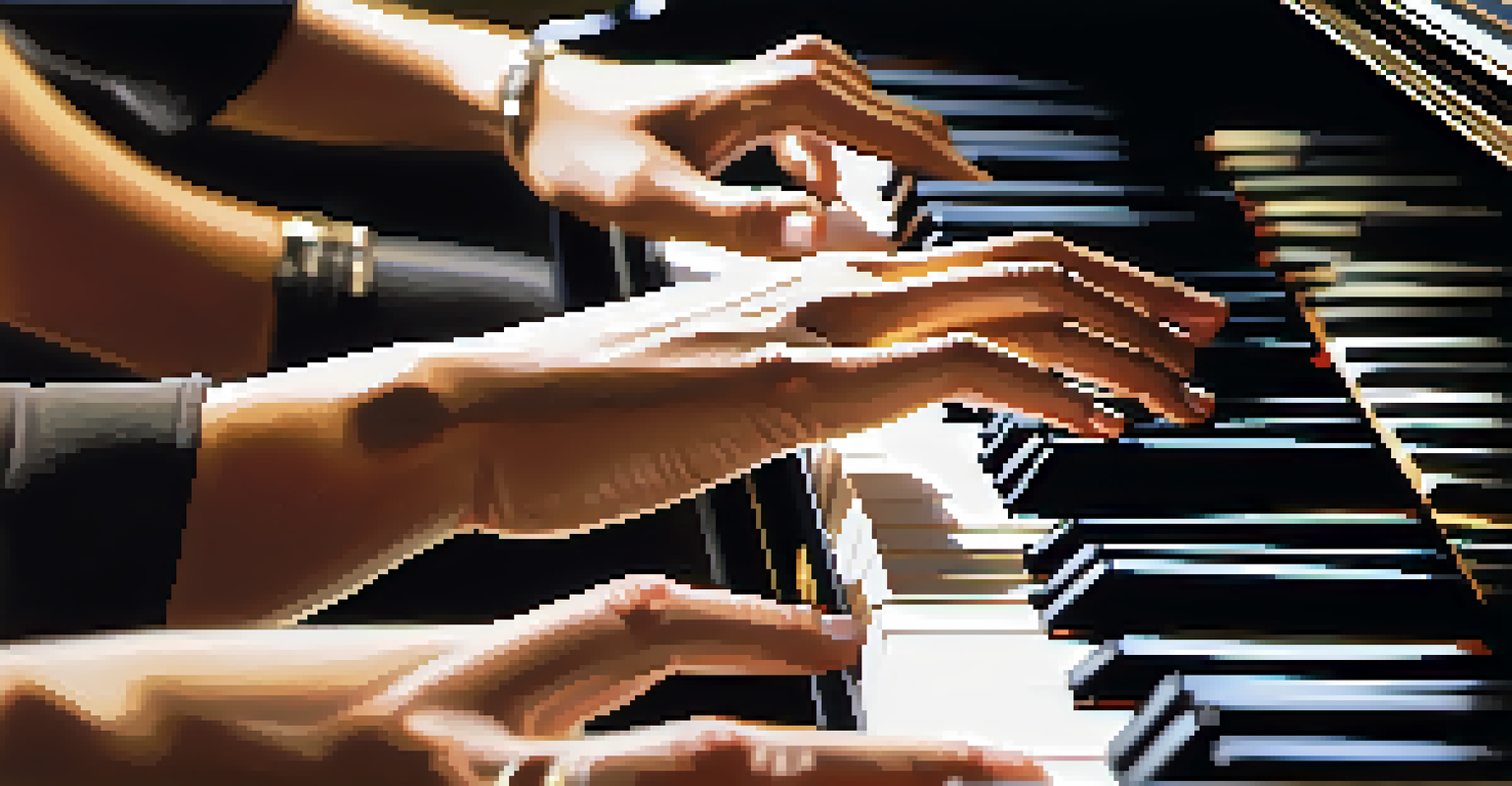How Music Alters Our Experience of Time in Everyday Life

The Connection Between Music and Time Perception
Have you ever noticed how a catchy song can make time fly? When you're enjoying music, your brain processes it in a way that can alter your perception of time. This phenomenon is not just a fun quirk; scientists have studied how our internal clocks can speed up or slow down based on the rhythm and tempo of the music we hear.
Music can change the world because it can change people.
For example, fast-paced music often makes activities feel shorter, while slower tunes can stretch moments out. This is why a great playlist can turn a long workout into a breeze, helping you lose track of the minutes. The emotional connection we have with music plays a crucial role in this experience, allowing us to feel more engaged with the present moment.
Ultimately, our perception of time is subjective, and music is one of the powerful tools that can manipulate it. Whether you’re dancing at a party or relaxing at home, the right soundtrack can completely shift your experience of time.
Music’s Role in Daily Activities and Routines
Think about how you listen to music while commuting or doing chores. Many people find that their daily tasks become more enjoyable and feel less tedious when accompanied by their favorite songs. This is because music can create a sense of rhythm that enhances our productivity and makes the time spent on these tasks seem shorter.

For instance, a study found that individuals who listened to music while performing repetitive tasks reported feeling more motivated and engaged. This effect is so powerful that many workplaces now include music as part of their environment to boost morale and efficiency. It’s a simple yet effective way to make mundane routines more bearable.
Music Alters Time Perception
The rhythm and tempo of music can significantly change how we perceive the passage of time, making enjoyable moments feel shorter or longer.
So, the next time you're tackling a long to-do list, consider adding some tunes to the mix. You might be surprised at how much quicker the time flies and how much more you enjoy the process.
Emotional Impact of Music on Time Experience
Music isn’t just about sound; it’s tied deeply to our emotions. When we listen to music that resonates with our feelings, it can warp our perception of time in profound ways. For example, a heartfelt ballad might make a moment feel longer as we soak in its emotional weight, while an upbeat track can create a euphoric sense of time flying.
Without music, life would be a mistake.
This connection between music and emotion is why certain songs are tied to specific memories. You might hear a song from your childhood and immediately be transported back in time, reliving those moments. It’s as if music serves as a time machine, allowing us to navigate our personal histories.
In essence, the emotional landscape painted by music can enhance or distort our experience of time, making it a powerful tool in our daily lives.
The Science Behind Music and Time Perception
Researchers have delved into the science of why music affects our perception of time. Studies suggest that tempo and rhythm play significant roles in how we experience time. Fast tempos can lead to a quicker sense of time passing, while slower tempos can create a feeling of time stretching out.
Interestingly, the brain’s processing of music involves various regions, including those responsible for emotions and memory. This interconnectedness explains why certain songs can evoke strong feelings and memories, further influencing our perception of time. The brain's ability to synchronize with music's rhythm can also alter how we experience the world around us.
Emotions Shape Our Time Experience
Music deeply connects with our emotions, allowing us to relive memories and altering our perception of time based on the feelings evoked.
By understanding the science behind this phenomenon, we can better appreciate the way music enhances our daily experiences and shapes our perception of time.
Music as a Tool for Mindfulness and Presence
In a fast-paced world, music can serve as a tool for mindfulness, helping us stay present. When we focus on the sounds, lyrics, and emotions of a song, we can ground ourselves in the moment. This practice can be particularly beneficial during stressful times when our minds tend to race.
For example, creating a calming playlist for moments of anxiety can help slow down our perception of time, allowing us to breathe and reflect. Engaging with music mindfully can create a sanctuary in our busy lives, turning fleeting moments into rich experiences filled with depth.
In this way, music not only alters our experience of time but also enhances our ability to be present and engaged with what we’re doing.
Cultural Differences in Music and Time Experience
Cultural factors also play a role in how we experience time through music. Different genres, rhythms, and styles can evoke varying perceptions of time across cultures. For instance, traditional music from different regions often carries its unique tempo and rhythm, influencing how people within those cultures perceive time.
Consider the contrast between the upbeat rhythms of Caribbean music and the more laid-back tempos of folk music from other cultures. Each style not only reflects cultural values but also shapes how individuals experience and relate to time. This diversity enriches our understanding of music's impact on our lives.
Personalized Playlists Enhance Life
Creating tailored playlists for different activities can enhance our daily experiences and positively manipulate our perception of time.
By exploring these cultural nuances, we can appreciate the universal yet distinct ways music alters our experience of time.
Creating Personalized Soundtracks for Life
One of the best ways to harness the power of music in our daily lives is by creating personalized soundtracks. By curating playlists that align with our activities and moods, we can enhance our experiences and manipulate our perception of time. For instance, an energizing playlist can accompany a workout, while soothing melodies can aid relaxation.
Think about what moments in your life could benefit from a soundtrack. Whether it’s a road trip, a dinner party, or even a quiet evening at home, the right music can elevate the experience, making time feel richer and more fulfilling. This intentional approach to music can transform the mundane into something special.

So, take some time to create your own playlists tailored to your daily activities. You might find that music becomes an integral part of how you experience time and life itself.